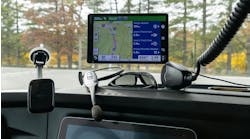Lower costs, “a la carte” options becoming critical in mobile computing, Qualcomm says
SAN DIEGO. One of the reasons Qualcomm developed its new Mobile Computing Platform 50 or “MCP50” device was to address the growing need for lower cost mobile computing solutions for smaller fleets. These types of solutions, like the MCP50 unveiled here at the 2011 Truckload Carriers Assn. (TCA) convention, allow fleets to pick and choose among various applications, explained Norm Ellis, the company’s vice president for transportation logistics sales and services.
“We designed the MCP50 specifically for medium to small fleet operators, so they can build in only the functionality they want and keep their costs down,” he explained at an interview at the TCA show.
“We’ve tried to create a ‘right-sized’ product here that gives the medium and small guys the same computing and technology advantages larger fleets get with our MCP100 and MCP200 systems,” he added. “Also, with trucking facing a host of new regulations – especially CSA [Compliance, Safety, Accountability] – medium and smaller fleets will need to buy the technological capability they need at a price point they can afford.”
The list price of an MCP50 is $799, with communication and data reporting fees starting as low as $24.99 per month, said Ellis. Fleets can then build capability into the MCP50 “a la carte” by selecting just the functionality they want - electronic onboard recording [EOBR] for compiling driver logbook data, monitoring engine idle time, or critical event recording such as hard braking maneuvers, etc.
Ellis noted Qualcomm is offering ALK’s CoPilot Truck on-board, truck-specific GPS navigation solution with the MCP50 as it’s a lower-cost option than its other real-time navigation service – again, as a way to give medium and smaller carriers a chance to tap into technology that potentially can help them improve efficiency without breaking the bank.
“We’re even thinking of an ultra-low tier where this device acts only as an EOBR, just for compiling driver logs,” he said.


